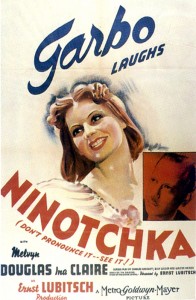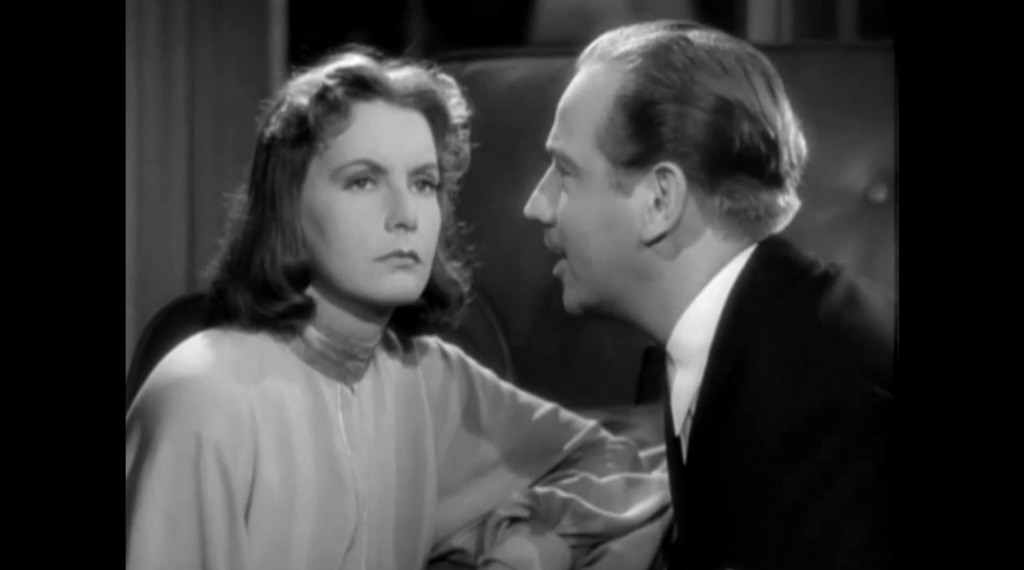|

Synopsis:
Three Russian representatives (Sig Ruman, Felix Bressart, and Alexander Granach) sent to Paris to sell some jewels formerly belonging to a countess (Ina Claire) are converted into fun-loving capitalists by Claire’s lover (Melvyn Douglas). When a solemn Russian emissary (Greta Garbo) arrives to rectify the situation, Douglas finds himself smitten with her, and an unexpected romance ensues.
|
|
Genres, Themes, Actors, and Directors:
- Bela Lugosi Films
- Cross-Cultural Romance
- Ernst Lubitsch Films
- Greta Garbo Films
- Melvyn Douglas Films
- Romantic Comedy
Response to Peary’s Review:
Peary notes that Garbo “gives an intelligent, witty performance” in this “comedy classic” by Ernst Lubitsch, which was marketed to audiences as the film in which “Garbo laughs!” Peary spends the bulk of his review analyzing the script (by Billy Wilder, Charles Brackett, and Walter Reisch), which he claims “levels so many zingers at bureaucratic Russia… that one believes [the screenwriters] are unfavorably contrasting it with France”, at least until it’s implied that “the country belongs to aristocrats (we rarely see the common folk) and other decadent elements”. He argues that “this is not one of Lubitsch’s funniest comedies”, given that “almost all of the humor is supposed to emanate from poor Russian characters being impressed by what we take for granted”, and notes that “the constant barrage of anti-Russian propaganda makes us feel we’re back in grammar school and having our first (manipulative) political-science lesson (indoctrination)”.
It’s true that the strongly anti-Communist bent of the screenplay feels a bit heavy-handed at times, but it’s difficult not to be impressed by the filmmakers’ ability to get away with such a bold political satire during a time of increasing turmoil on the global landscape. Meanwhile, what most people remember about the film — rather than its contextualizing narrative — is the central romance between Garbo and Douglas (who Peary argues “is an acquired taste”; I think he suits the role well). They have fine chemistry together, and while we don’t quite understand why Douglas falls so head-over-heels in love with icy-cold Garbo at first sight (she’s nearly robotic in her calculated responses to him), it’s undeniably charming to see her eventually “melting” in the heat of his charms.
Redeeming Qualities and Moments:
- Greta Garbo as Ninotchka (nominated as one of the Best Actresses of the Year in Peary’s Alternate Oscars)

- A fine, witty script by Charles Brackett, Billy Wilder, and Walter Reisch:
“The last mass trials were a great success. There are going to be fewer but better Russians.”
Must See?
Yes, as a genuine comedic classic.
Categories
- Genuine Classic
- Oscar Winner or Nominee
(Listed in 1001 Movies You Must See Before You Die)
Links:
|


One thought on “Ninotchka (1939)”
A once-must, for its place in cinema history and for Garbo’s performance.
I had not, till now, seen ‘Ninotchka’ in quite a long time; it’s not a film I feel drawn to return to. Having just rewatched ‘Silk Stockings’, however, returning to ‘Ninotchka’ is a bit of a drab experience…slightly. In a sense, it’s not fair to compare the two – they work in different ways, and ‘Ninotchka’ has fun things that aren’t in ‘SS’. But ‘SS’ is a big, colorful, zesty musical with a catchy score and lively performances – so that combination is going to be hard not to prefer.
‘Ninotchka’ also has fine performances. And it probably has a better, richer script in terms of character development (esp. the two leads). This earlier version does have a lot of funny/clever lines in it. While rewatching, I could hear what had been kept for ‘SS’ and what had been removed – and, of course, much had to be removed for ‘SS’, to make room for all of the musical numbers. As well, ‘SS’ jettisons the whole ‘jewel thieves’ thing (to me, a less interesting storyline anyway than the one in ‘SS’: a Russian composer tries to defect).
But…’Ninotchka’ does have Garbo. And it’s lovely seeing her come alive with a role so different from what we’re used to seeing her play (esp. after all of the more-typical romance roles). She’s allowed an interesting freedom as an actress here, so she’s definitely fun to watch. I don’t think Cyd Charisse in ‘SS’ is at all inferior to Garbo, though – they both bring something wonderful in their interpretations.
Note: As Razinin, Bela Lugosi gets billing close to the top but actually has a small role. He’s quite effective tho, having been properly encouraged by Lubitsch. I actually wanted him to have more screen time here, but alas…